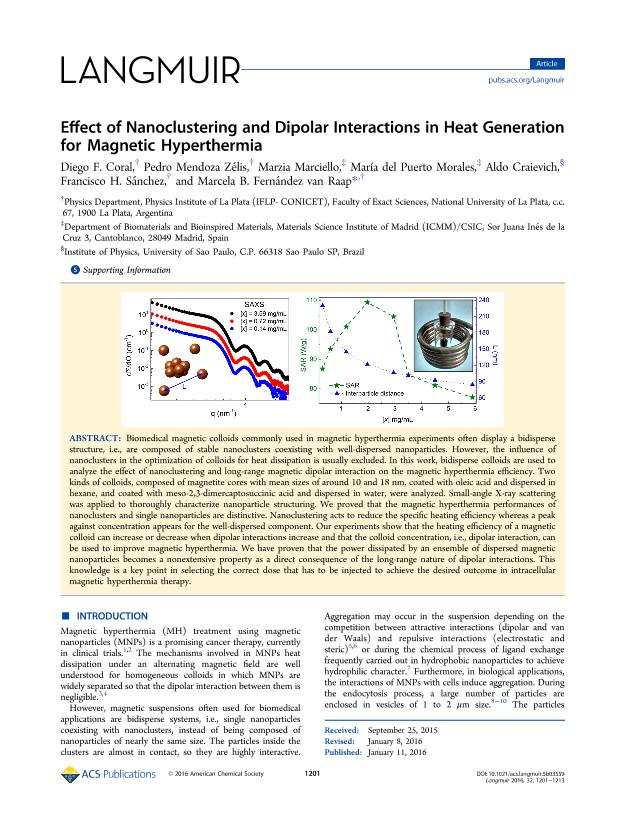Artículo
Effect of Nanoclustering and Dipolar Interactions in Heat Generation for Magnetic Hyperthermia
Coral, Diego Fernando ; Mendoza Zélis, Pedro
; Mendoza Zélis, Pedro ; Marciello, Marzia; Morales, María Del Puerto; Craievich, Aldo; Sánchez, Francisco Homero
; Marciello, Marzia; Morales, María Del Puerto; Craievich, Aldo; Sánchez, Francisco Homero ; Fernández van Raap, Marcela Beatriz
; Fernández van Raap, Marcela Beatriz
 ; Mendoza Zélis, Pedro
; Mendoza Zélis, Pedro ; Marciello, Marzia; Morales, María Del Puerto; Craievich, Aldo; Sánchez, Francisco Homero
; Marciello, Marzia; Morales, María Del Puerto; Craievich, Aldo; Sánchez, Francisco Homero ; Fernández van Raap, Marcela Beatriz
; Fernández van Raap, Marcela Beatriz
Fecha de publicación:
02/2016
Editorial:
American Chemical Society
Revista:
Langmuir
ISSN:
0743-7463
Idioma:
Inglés
Tipo de recurso:
Artículo publicado
Clasificación temática:
Resumen
Biomedical magnetic colloids commonly used in magnetic hyperthermia experiments often display a bidisperse structure, i.e., are composed of stable nanoclusters coexisting with well-dispersed nanoparticles. However, the influence of nanoclusters in the optimization of colloids for heat dissipation is usually excluded. In this work, bidisperse colloids are used to analyze the effect of nanoclustering and long-range magnetic dipolar interaction on the magnetic hyperthermia efficiency. Two kinds of colloids, composed of magnetite cores with mean sizes of around 10 and 18 nm, coated with oleic acid and dispersed in hexane, and coated with meso-2,3-dimercaptosuccinic acid and dispersed in water, were analyzed. Small-angle X-ray scattering was applied to thoroughly characterize nanoparticle structuring. We proved that the magnetic hyperthermia performances of nanoclusters and single nanoparticles are distinctive. Nanoclustering acts to reduce the specific heating efficiency whereas a peak against concentration appears for the well-dispersed component. Our experiments show that the heating efficiency of a magnetic colloid can increase or decrease when dipolar interactions increase and that the colloid concentration, i.e., dipolar interaction, can be used to improve magnetic hyperthermia. We have proven that the power dissipated by an ensemble of dispersed magnetic nanoparticles becomes a nonextensive property as a direct consequence of the long-range nature of dipolar interactions. This knowledge is a key point in selecting the correct dose that has to be injected to achieve the desired outcome in intracellular magnetic hyperthermia therapy.
Palabras clave:
Magnetic Colloids
,
Magnetic Hyperthermia
,
Saxs
,
Biomedical Aplications
Archivos asociados
Licencia
Identificadores
Colecciones
Articulos(IFLP)
Articulos de INST.DE FISICA LA PLATA
Articulos de INST.DE FISICA LA PLATA
Citación
Coral, Diego Fernando; Mendoza Zélis, Pedro; Marciello, Marzia; Morales, María Del Puerto; Craievich, Aldo; et al.; Effect of Nanoclustering and Dipolar Interactions in Heat Generation for Magnetic Hyperthermia; American Chemical Society; Langmuir; 32; 5; 2-2016; 1201-1213
Compartir
Altmétricas



